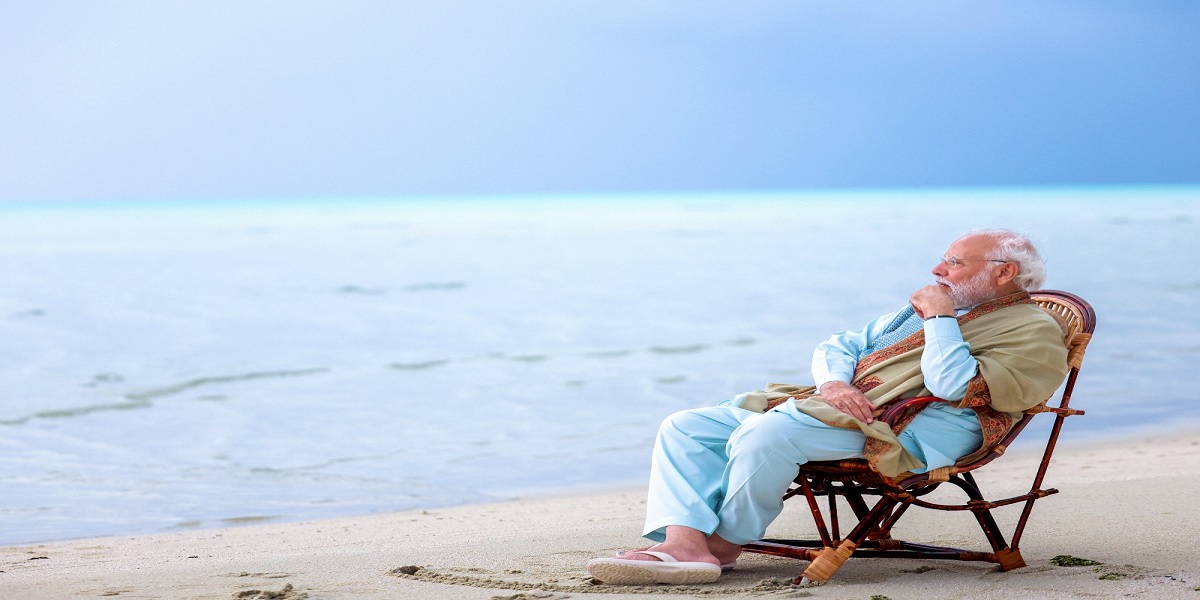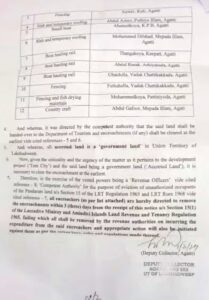Published Jan 01, 2025 | 9:00 AM ⚊ Updated Jan 01, 2025 | 11:43 AM

PM Modi in Lakshadweep(X)
“I am still in awe of the stunning beauty of its islands and the incredible warmth of its people.” These were the words of Prime Minister Narendra Modi in January 2024, following his highly publicised visit to Lakshadweep.
Union Home Minister Amit Shah praised the visit, describing Lakshadweep as a future global tourism hub. “Gratitude to PM Narendra Modi Ji for promoting Lakshadweep. This will surely boost tourism, the economy, and thus elevate the living standards of its people,” he tweeted.
Modi’s visit was also seen as a strategic counter to the Maldives’ pro-China shift under President Mohamed Muizzu. It sparked hopes of economic growth, with resort projects announced to attract tourists. However, the story has since taken a darker turn.
Today, Lakshadweep’s residents are protesting against the administration, fearing displacement and the loss of their land. What began as dreams of development has spiralled into fears of survival.
While Modi’s snorkelling photoshoot dominated headlines, the islanders’ struggles have largely been ignored.
At the heart of the issue is a luxury tent city project currently under development, with 200 tents planned for Thinnakara Island and 150 for Bangaram islands of Lakshadweep. Tent cities are typically set up in areas where permanent infrastructure is restricted due to environmental regulations or to manage large tourist influxes during festivals. The initiative aims to boost tourism by providing infrastructure upgrades in the form of modern amenities such as scuba diving, a health and wellness centre, a children’s play area, and a coffee shop.
The Lakshadweep tent city project commenced on 14 June 2022 under a five-year contract, with an option for a two-year extension.
However, concerns have been raised about the ecological sensitivity of these islands, which are uninhabited. Critics caution that unscientific activities could harm the fragile ecosystem. Alongside Thinnakara and Bangaram, a tent city project is also underway at Agatti Island, managed by the Lakshadweep Tourism Department.
Sabith, a Youth Congress leader from Lakshadweep, told South First that large-scale construction activities on Thinnakara and Bangaram Islands, labelled as ‘temporary’ under the guise of tourism, pose a threat to the community. He says the developments involve significant use of concrete, potentially causing irreversible ecological damage.
On 13 November, a Division Bench of the Kerala High Court overturned an earlier single-judge order that had directed the Lakshadweep Administration to halt construction. In their ruling, Justices Anil K Narendran and Muralee Krishna S allowed the construction of temporary structures, such as tents for tourist accommodation, to continue while writ petitions contesting land allotments remain unresolved.
The Bench noted that significant funds had already been invested and that construction was nearing completion, thereby paving the way for work to resume. With legal hurdles cleared, construction has accelerated, raising fears of environmental degradation and biodiversity loss.
“After Modi’s visit, Bangaram and Thinnakara have become tourist hotspots. However, a Gujarat-based company is violating protocols, including engaging in large-scale concrete mixing and construction. The people of Lakshadweep largely depend on coconut products and fishing for their livelihood. As part of the construction, the company cut down hundreds of coconut trees without even informing the residents,” Sabith said.
Advocate Fathima Sulfath, a native of Lakshadweep and an advocate at Kerala’s Ernakulam District Court, told South First: “In Thinnakara and Bangaram, the Coastal Regulation Zone (CRZ) laws are being completely violated. The concrete being used is the same as that used for permanent constructions, according to my people there.”
Furthermore, the project is being spearheaded by the Gujarat-based Praveg Ltd., known for similar projects in Narmada, Varanasi, and Ayodhya.
The company was recently also granted approval to develop tent city projects in the Union Territories of Dadra and Nagar Haveli, as well as Daman and Diu – regions currently administered by Praful Khoda Patel, the Gujarat-origin, controversial former administrator of Lakshadweep.
Locals allege a connection between Praveg Ltd, Patel, and the fact that all its projects are approved in BJP-administered states or Union Territories. However, evidence to confirm any links is so far lacking.
The project is also threatening the livelihoods of local fishermen who depend on the waters surrounding the islands. A Deputy Collector’s notice has declared fishing areas around Agatti Island as earmarked for the tent city project, demanding that all “encroachments” by local fishermen, including boats, sheds, and drying equipment, be removed within three days or face seizure and associated costs imposed by revenue officials.

The eviction notice served to fishermen by the Agatti Deputy Collector states that the accreted land is government land.
Mansoor, a fisherman from Agatti, criticised the move, pointing out that 40 percent of the island’s population depends on fishing. He questioned why the project was being implemented in a densely populated area rather than less populated regions like the southern side of the island or tourism-focused islands like Bangaram and Thinnakara, where no fishing activities occur.
“The collector said in the notice that these are accreted lands. But what about our livelihood?” he asked.
The Deputy Collector’s notice states that all accreted (land gained from the sea) land in Lakshadweep, classified as CRZ land, is government property. This land, located between the low-tide and high-tide lines, has been used by local fishers for generations.
The 2011 CRZ notification, which amended the 1991 rules, includes provisions to protect the coastal environment and the traditional livelihoods of fishers. It also regulates industrial development and construction activities along the coast.
However, the land designated for the tent city is being acquired under Section 15 (1) of the Laccadive Minicoy and Amindivi Islands Land Revenue and Tenancy Regulation, 1965. Fishers are being evicted under the claim that the land is accreted.
“We have been using this land for generations. It has always belonged to us,” Sabith said. “For years, we have earned agricultural income from the trees here. The sheds and the land around them have been in our possession. Due to the unique circumstances of Lakshadweep, most people do not have formal land documents.”
TP Abdul Jabbar, General Secretary of the NCP (SP) in Lakshadweep, told South First: “The land in Thinnakara, classified as Panadara Bhoomi (in the local language, meaning accreted land), has been used by locals for several years. However, the Lakshadweep administration is now claiming ownership, and a legal dispute is ongoing in the Kerala High Court.
“The court recently ordered that the status quo be maintained, but the Gujarat company violated this. The status quo must be respected until the court delivers its final verdict.”
Meanwhile, residents have voiced concerns through peaceful protests, steering clear of violent demonstrations.
Sivasankaran Bijoy Nandan, a professor at CUSAT’s School of Marine Sciences, speaking to South First, highlighted the environmental vulnerability of Lakshadweep’s atolls, such as Bangaram Island, and the need for careful development. He stressed that disturbing coral ecosystems could result in significant setbacks, urging that any construction in these areas must adhere to strict Environmental Impact Assessment (EIA) protocols.
Nandan underlined the unique nature of atolls, which are home to diverse marine life, including clownfish, and warned that activities such as excavation and drilling could disrupt the delicate balance. He also pointed out similar challenges faced in the Maldives and Nicobar Islands, where development prioritises ecological sustainability.
Noting the severe pollution in Lakshadweep, including microplastics and metal contamination, he emphasised the importance of educating locals on environmental responsibility. Nandan further warned that extreme weather events in the Arabian Sea could exacerbate the region’s challenges.
His team’s upcoming report, expected to be released in two to three months, aims to guide future development in a way that does not compromise the environment.
(Edited by Dese Gowda)

